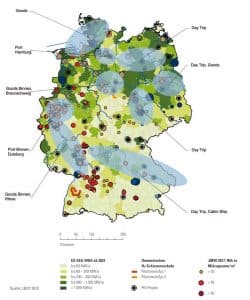A study called ShipFuel has analyzed how technically and economically feasible it is to use fuel cell systems running on electricity-derived fuels aboard inland waterway vessels by comparing them with conventional diesel engines used for ship propulsion.
The study, commissioned by the German transportation ministry, was coordinated by NOW under the auspices of the German NIP program.
It covers the entire supply chain from fuel production, distribution and storage to refueling and onboard energy consumption. It takes a closer look at the current regulatory framework, identifies potential markets and provides suggestions for commercializing alternative fuel technology [1].
Electricity-derived fuels
These fuels are known by several names, such as e-fuels and power-to-fuels. Examples are hydrogen, substitute natural gas (primarily CH4) and synthetic diesel fuel. What they have in common is that they are all produced from renewable electricity.
Introduction
The GHG emissions reduction targets set by the German government and agreed on globally can only be achieved by a long-term and sustainable decrease in energy consumption and an extensive use of clean energy sources in all relevant industries. Inland waterways are a crucial means of transporting cargo over long distances across Germany. In the past years, the volume of goods shipped has remained at a nearly constant level of around 60 billion ton-kilometers (41 billion ton-miles) [2], which is around 9 percent of the total transported nationally [3]. Ferries and other passenger ships are similarly important to the German transportation sector. So far, many of these vessels use diesel to operate near or in urban areas. However, the market for inland waterway vessels will, not unlike other industries, have to contribute to emissions reductions to improve air quality across the country. Using electricity-derived fuels in fuel cells, especially if these fuels are produced from clean energy sources, has the potential to solve the aforementioned issues and help advance energy systems integration.
…
read more in H2-international May 2020
Authors:
Dr. Ulrich Bünger, Martin Zerta, Patrick Schmidt, Werner Weindorf
Ludwig-Bölkow-Systemtechnik GmbH (LBST)
Lars Langfeldt, Benjamin Scholz, Lea-Valeska Giebel
DNV GL SE
Peter Klemm, Gunter Sattler
Ingenieurbüro für Schiffstechnik (IfS)

























0 Comments